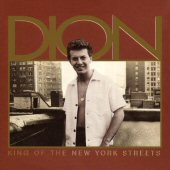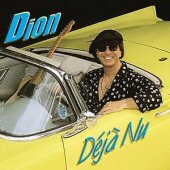- Dion: King Of The New York Streets, Right Stuff, 2000
- Dion: Déjà Nu, Collectables, 2000
 King Of The New York Streets surveys Dion Dimucci’s career, from his beginnings as a Bronx street corner doo-wopper through forays into the blues, singer/songwriter folk, CCM and beyond.
King Of The New York Streets surveys Dion Dimucci’s career, from his beginnings as a Bronx street corner doo-wopper through forays into the blues, singer/songwriter folk, CCM and beyond.
Initially recording as Dion and the Timberlanes –whose six tracks are included on The Complete Dion & the Belmonts (Collector’s Choice 1998) – the renamed quartet scored in early 1958 with ‘I Wonder Why.’
Tougher – and hipper – than the competition, they hit the charts nine times – including ‘A Teenager In Love’ and an update of the standard ‘Where Or When’ – before Dion went solo in 1960. That following year sales went through the roof with ‘Runaround Sue’ and ‘The Wanderer.’
Dion discussed his approach in Goldmine (March 9, 2001): “I always say that my music is like black music filtered through an Italian neighborhood and comes out with an attitude: ‘Yo!’ It’s true. It has all those elements. But the New York Italian-American, there’s an element of, ‘Yo! You talkin’ to me?’ There’s this kind of idea, like you come across like you’re supposed to know everything. I don’t know where I got that idea, ‘cause it’s absurd, but anyway, that’s the attitude. I would say it’s a confidence. I don’t know what the foundation is. It might be a little shallow, but it’s kind of a New York foundation.”
For all the posturing, though, there was a barely concealed vulnerability. Original songs like ‘I Was Born To Cry’ and ‘Lovers Who Wander’ suggest another side. The set’s title track– from 1989’s Yo Frankie! – boasts until the final verse, in which he admits “I was wise in my own eyes, I awoke one day and I realized/You know this attitude comes from cocaine lies.” In the liner notes he explains “It’s like ‘The Wanderer’ coming clean on yourself.”
Always ahead of the competition, by the time the British invasion hit in 1964 he was recording blues material and covering Bob Dylan. While the hits subsided for a few years, he came back in 1968 with one of his most popular songs, ‘Abraham, Martin & John.’
Too often career-spanning anthologies are top loaded with the strongest material in the first few years, followed by lesser efforts. In Dion’s case, the quality rarely subsides, with every phase and era offering gems. Obscure tracks like ‘My Girl the Month of May,’ from a short-lived Belmonts reunion in 1966, and ‘Your Own Backyard’ are every bit as good as the hits. From 1970, ‘Backyard’ deals with his years of heroin addiction, which he’d developed during his teens and maintained until 1968. The matter-of-fact delivery gets the point across without resorting to preaching.
Dion offers observations on all 65 songs. Regarding ‘The Truth Will Set You Free’ – ‘Jesus died upon the cross/all was won, nothing lost/and the truth will set you free’ – he explains “It’s an important song. One thing about rock ‘n’ roll at it’s best is that it proclaims your personal freedom and expresses your individuality. It has truth and it has freedom, and if you’re a rocker, you care about both of those things. There are a lot of guys who don’t even get their own message. They sing about it but they never appropriate it in their lives, they never grab on to it in reality.”
Like Johnny Cash, Dion’s straightforward integrity –coupled with a knowing swagger – permeates everything he sings. With the exception of Cash, he’s the only 50’s era artist recording today who has managed to produce vital music consistently throughout the entire length of his career.
 Déjà Nu marks a return to his roots. Many of the songs were written for the soundtrack of the forthcoming film biography, The Wanderer. Featuring a dozen period sounding tracks, the disc was recorded on analog gear employing the same techniques used on his early hits. This is lighter fare, with subject matter limited to “cars, girls, love and music.” Upbeat and fun, it’s a perfect look back that manages to capture the mood without coming across overly maudlin.
Déjà Nu marks a return to his roots. Many of the songs were written for the soundtrack of the forthcoming film biography, The Wanderer. Featuring a dozen period sounding tracks, the disc was recorded on analog gear employing the same techniques used on his early hits. This is lighter fare, with subject matter limited to “cars, girls, love and music.” Upbeat and fun, it’s a perfect look back that manages to capture the mood without coming across overly maudlin.
© John Cody 2001